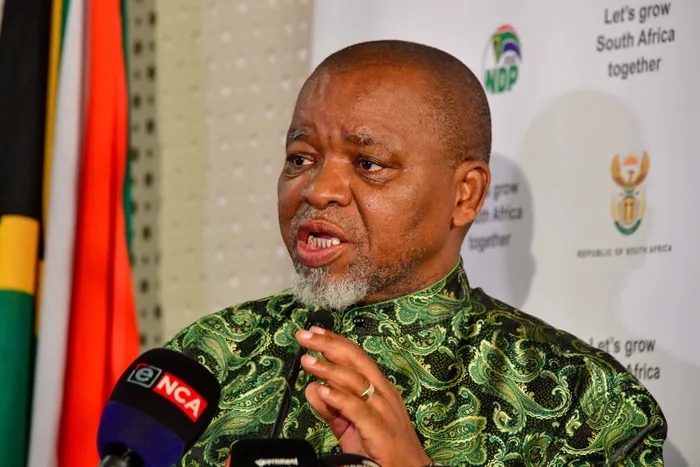
Gwede Mantashe, South Africa’s Minister of Mineral and Petroleum Resources, said resource-rich countries, such as South Africa, face a predicament where they not only export minerals in their raw form, but they equally export the jobs and profits that ought to accrue to them.
Image: GCIS
The shifting geopolitical dynamics and the global scramble for Africa’s critical minerals have revealed competing visions of how to turn Africa’s resources into geopolitical leverage.
In an increasingly multipolar and fragmented world, critical raw materials have become a new ‘currency’ of power and African states, as key providers, can leverage these resource deals to negotiate equitable partnerships that support sustainable development, industrialisation, and stability.
At the 20th CII India–Africa Business Conclave, Sevala Naik Mude, Additional Secretary for India’s Ministry of External Affairs, highlighted the pivotal role of India–Africa collaboration in shaping a sustainable future through the harnessing of critical minerals.
But Mude’s recognition of Africa’s rich reserves of critical minerals, which are essential for the global clean energy transition, came with an important caveat as he stressed that these resources “belong first and foremost to Africa.”
India’s approach, he emphasised, is collaborative rather than extractive.
Speaking at a session on Harnessing Critical Minerals for a Sustainable Future, he highlighted how the partnership between the two regions has matured over the past two decades, creating opportunities that go far beyond trade.
“Over the years, India–Africa relations have achieved several milestones,” Mude said. “Our trade, which stood at about 30–35 billion dollars in 2010–11, has now crossed the 100-billion-dollar mark—a remarkable achievement that reflects the efforts and enterprise of business communities on both sides.”
He said that India is currently the fifth-largest investor in Africa, with investments exceeding $80 billion and these investments are not limited to mining alone but extend into manufacturing, value addition, and services.
“Indian businesses have gone beyond exploration to establish industries that generate local employment and contribute to sustainable growth,” he noted, citing Nigeria, Mozambique, Morocco, Tunisia, and South Africa as key investment destinations.
He said that the real opportunity lies in joint exploration, joint production, and value addition within Africa itself.
“Simply extracting and exporting minerals is not enough—it does not guarantee long-term growth or sustainable development. What we must pursue together is a model of partnership where Africa’s mineral wealth is transformed into industrial strength, ensuring inclusive prosperity,” he said.
India has already taken concrete steps to support this vision by extending preferential access for African exports—processed and unprocessed—through the Duty-Free Tariff Preference Scheme. Mude emphasised the need for a greater focus on joint ventures, local processing facilities, and manufacturing partnerships that can generate greater long-term value.
Investing in human capital, training, capacity building, and technical cooperation, were also critical pillars of these partnerships.
Mude called for India and Africa to move forward together with a shared vision. “By sharing best practices, aligning policies, building industries, and developing skills, we can harness Africa’s critical minerals not just for economic gains, but for building a sustainable and inclusive future.”
Gwede Mantashe, South Africa’s Minister of Mineral and Petroleum Resources, speaking at the G20 Critical Minerals Stakeholder Engagement said resource-rich countries, such as South Africa, face a predicament where they not only export minerals in their raw form, but they equally export the jobs and profits that ought to accrue to them, consequently perpetuating poverty and inequality.
“Despite this long history of mining, countries that are endowed with natural resources, such as ours, have had to contend with underdeveloped infrastructure, inadequate investment in exploration, extraction, and processing, decent work deficits as well as unequal access to downstream economic benefits largely due to the overconcentration of supply chains in a few industrialised economies.”
Mantashe said solidarity, equality, and sustainability in harnessing critical minerals means ‘striking a balance between ambition and pragmatism, seeking transformative change in the mining sector while ensuring that cooperation remains voluntary, inclusive, and attuned to the contexts of member countries’.
The G20 Think Tank has also warned about critical energy transition minerals (CETMs), which are vital for clean energy technologies, but their life cycle is associated with substantial environmental, social, and governance risks.
These risks disproportionately affect local communities and countries in the Global South, where much of the mineral extraction takes place.
Ultimately, harnessing Africa’s critical minerals must directly benefit Africa-by creating value locally, building industries, generating employment, and strengthening socioeconomic development across the continent.
* Dr Govender is an academic and a keen observer of issues related to international relations.
** The views expressed do not necessarily reflect the views of IOL or Independent Media.